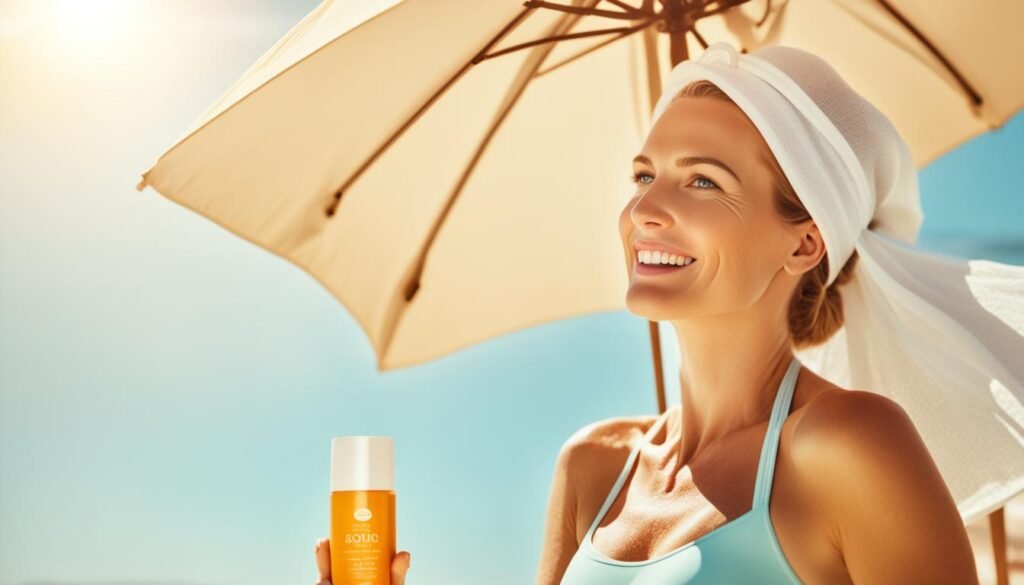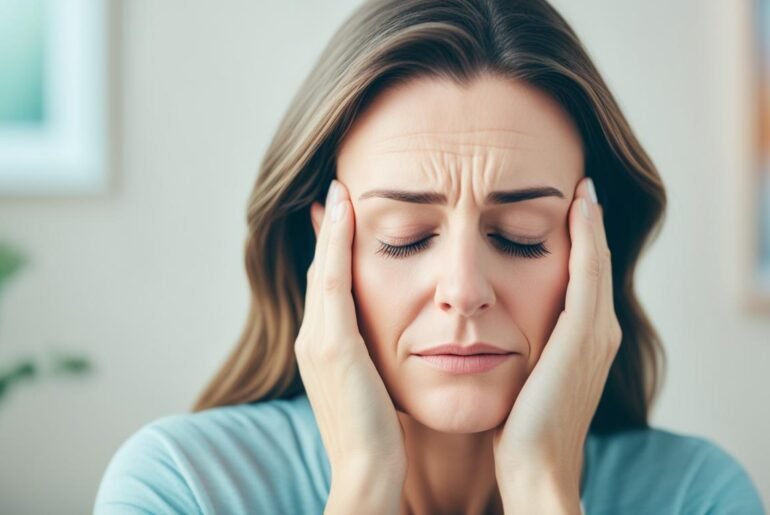Did you know that stress can accelerate skin aging and lead to the appearance of wrinkles? It’s true. Scientific research has shown that stress hormones like cortisol can contribute to skin dehydration, sallowness, roughness, and increased expression lines. The impact of stress on the skin is significant, but the good news is that there are strategies and techniques to prevent stress-related skin aging.
To prevent stress-related skin aging, it’s important to address both external and internal factors. Implementing stress management techniques, maintaining a healthy lifestyle, and using appropriate skincare products can all play a role in preventing and reducing the signs of stress-related skin aging. Let’s explore how you can take control of your skin health and prevent the effects of stress on your complexion.
Key Takeaways:
- Stress can accelerate skin aging and cause the appearance of wrinkles.
- Addressing both external and internal factors is important for preventing stress-related skin aging.
- Implement stress management techniques to reduce the impact of stress on your skin.
- Maintain a healthy lifestyle by getting enough sleep, following a nutritious diet, and engaging in regular exercise.
- Use targeted skincare products that contain stress-reducing and collagen-boosting ingredients.
The Impact of Stress on Skin
Stress can have a profound impact on the health and appearance of the skin. When we experience stress, our bodies release stress hormones, such as cortisol, which can wreak havoc on the skin’s natural balance. The effects of cortisol on the skin can lead to a variety of issues, including accelerated skin aging and the development of stress-related skin conditions.
The Role of Stress Hormones in Skin Aging
Stress hormones like cortisol can disrupt the skin’s barrier function, causing increased water loss and leaving the skin dehydrated. This can lead to a dull and sallow complexion, as well as a rough and uneven texture. Additionally, cortisol can decrease collagen production in the skin, resulting in a loss of elasticity and the formation of wrinkles and fine lines.
Signs of Stress-Related Skin Aging
One of the telltale signs of stress-related skin aging is the deepening of expression lines, especially on the forehead, between the eyebrows, and around the mouth. Other common signs include skin dehydration, rough texture, and a tired and lackluster appearance. These visible manifestations of stress on the skin can serve as a reminder of the need to manage stress effectively.
Preventing the Effects of Cortisol on Skin
While it may not be possible to eliminate stress completely, there are steps that can be taken to minimize its impact on the skin. Implementing stress management techniques, such as exercise, meditation, and deep breathing exercises, can help reduce cortisol levels in the body and promote overall well-being.
| Signs of Stress-Related Skin Aging | Effects of Cortisol on Skin |
|---|---|
| Dehydration | Disruption of skin’s barrier function |
| Rough texture | Decreased collagen production |
| Deep expression lines | Loss of elasticity |
Protecting Your Skin From the Effects of Stress
In addition to stress management, incorporating a proper skincare routine into your daily life is essential. Look for skincare products that contain ingredients known to counteract the effects of stress on the skin, such as hyaluronic acid for hydration and antioxidants to combat oxidative stress. Additionally, sunscreen is crucial to protect the skin from further damage caused by UV rays, as stress can weaken the skin’s natural defenses.
By understanding the impact of stress on the skin and taking proactive measures to manage stress and care for your skin, you can help maintain a healthier, more youthful complexion.
Managing Stress for Skin Aging Prevention

Effective stress management plays a crucial role in preventing stress-related skin aging. By implementing stress reduction techniques, you can promote skin health and prevent the signs of aging caused by stress. Incorporating mindfulness, relaxation exercises, deep breathing, meditation, and engaging in activities that promote relaxation can all help reduce stress levels and improve skin health.
Mindfulness is a powerful technique that involves focusing one’s attention on the present moment and accepting it without judgment. By practicing mindfulness, you can cultivate awareness of your thoughts, emotions, and body sensations, which can help reduce stress and promote overall well-being. Taking a few minutes each day to practice mindfulness can have a positive impact on your skin health.
Relaxation exercises are another effective way to manage stress and maintain skin health. These exercises can include progressive muscle relaxation, guided imagery, and visualization techniques. By consciously relaxing each muscle group and visualizing a calm and peaceful environment, you can help reduce stress and promote a healthy complexion.
Deep breathing exercises are simple yet powerful techniques that can help activate your body’s relaxation response and reduce stress levels. By focusing on your breath and taking slow, deep breaths, you can release tension and promote a sense of calm. Incorporate deep breathing exercises into your daily routine to support skin health and prevent stress-related aging.
“The time to relax is when you don’t have time for it.” – Sydney J. Harris
In addition to mindfulness and relaxation techniques, engaging in activities that promote relaxation can further support skin aging prevention. These activities can include hobbies such as painting, gardening, listening to music, or practicing yoga. Find activities that bring you joy and help you unwind, as they can contribute to your overall well-being and skin health.
The Benefits of Stress Reduction Techniques for Skin Health
Practicing stress reduction techniques not only benefits your overall well-being but also has a direct impact on your skin health. When you are stressed, your body releases stress hormones like cortisol, which can contribute to skin dehydration, inflammation, and accelerated aging. By managing stress levels through relaxation techniques, you can help maintain the skin’s natural moisture balance, reduce inflammation, and prevent premature aging.
Incorporating stress reduction techniques into your self-care routine can also enhance the effectiveness of your skincare products. When your body is in a state of calm and relaxation, it is more receptive to the benefits of skincare ingredients, allowing them to penetrate deeper into the skin and deliver optimal results.
Take the time to prioritize stress management and incorporate these relaxation techniques into your daily life. Your skin will thank you for it as you enjoy the benefits of a healthier, more youthful complexion.
Lifestyle Habits for Stress Related Skin Aging Prevention
When it comes to preventing stress-related skin aging, incorporating healthy lifestyle habits is essential. By adopting these habits, you can support your skin’s health and maintain a youthful appearance. Let’s explore some key practices that can help prevent stress-related skin aging:
Sleep and Skin Aging
Getting enough sleep is crucial for skin repair and rejuvenation. During sleep, your body goes through a process of cellular regeneration, which includes skin cell turnover. Lack of sleep can lead to increased skin dullness, fine lines, and a decrease in collagen production. Aim for 7-9 hours of quality sleep each night to support your skin’s natural healing processes and prevent the signs of stress-related aging.
Diet and Skin Aging
A healthy diet plays a vital role in maintaining skin health. Consuming a variety of nutrient-rich foods, such as fruits, vegetables, whole grains, lean proteins, and healthy fats, provides your skin with essential vitamins, minerals, and antioxidants. These nutrients help protect against oxidative stress, boost collagen production, promote skin elasticity, and maintain a youthful complexion. Including foods like berries, leafy greens, fish, nuts, and avocados in your diet can have a positive impact on your skin’s health and prevent stress-related aging.
Exercise for Skin Health
Regular exercise not only benefits your overall health but also promotes skin health. Exercise increases blood circulation, delivering oxygen and nutrients to the skin cells, which helps improve skin tone and texture. It also promotes the production of collagen, a key protein responsible for maintaining skin elasticity and reducing the appearance of wrinkles. Engaging in activities such as yoga, jogging, swimming, or strength training can have a positive impact on your skin’s vitality and contribute to stress-related skin aging prevention.
| Lifestyle Habits | Impact on Skin Aging Prevention |
|---|---|
| Proper Sleep | Supports skin repair and rejuvenation, reduces fine lines and collagen loss |
| Healthy Diet | Provides essential nutrients, antioxidants, and supports collagen production |
| Regular Exercise | Improves blood circulation, promotes collagen production, and enhances skin texture |
Skincare for Stress Related Skin Aging
Combatting the signs of stress-related skin aging requires the use of targeted skincare products that address the specific concerns associated with stress. Incorporating stress-reducing ingredients into your skincare routine can effectively address visible skin wrinkling caused by repetitive facial expressions and help prevent and reduce the signs of stress-related aging.
One powerful ingredient to look for in stress-reducing skincare products is neuropeptides. Neuropeptides can target visible skin wrinkling by relaxing the muscles that contribute to expression lines. By incorporating neuropeptide-rich products into your routine, you can minimize the appearance of stress wrinkles and maintain a more youthful complexion.
Another essential ingredient for stress-related skin aging is hyaluronic acid. This powerful humectant provides immediate and long-lasting hydration to the skin, helping to combat dryness and plump up fine lines and wrinkles. By incorporating hyaluronic acid in your skincare routine, you can keep your skin well-hydrated and minimize the effects of stress-related aging.
Retinol, a derivative of vitamin A, is another key ingredient to consider for stress-related skin aging. Retinol stimulates collagen production, helps improve skin texture and tone, and reduces the appearance of wrinkles. By incorporating retinol-based products into your skincare routine, you can minimize the visible signs of stress-related aging and promote a smoother and more youthful complexion.
Let’s recap the stress-reducing skincare products:
- Neuropeptides: Address visible skin wrinkling caused by repetitive facial expressions.
- Hyaluronic Acid: Provides immediate and lasting hydration benefits to combat dryness and plump up fine lines and wrinkles.
- Retinol: Stimulates collagen production, improves skin texture and tone, and reduces the appearance of wrinkles.
By incorporating these stress-reducing skincare products into your routine, you can effectively target the signs of stress-related skin aging and maintain a healthier, more youthful complexion.
Recommended Skincare Products
| Product | Main Ingredient | Benefits |
|---|---|---|
| XYZ Skincare Serum | Neuropeptides | Reduces visible stress wrinkles and relaxes expression lines. |
| GlowHydrate Hyaluronic Acid Serum | Hyaluronic Acid | Provides intense hydration and plumps up fine lines and wrinkles. |
| RenewalRetinol Cream | Retinol | Stimulates collagen production and improves overall skin texture. |
These are just a few examples of stress-reducing skincare products available on the market. When selecting skincare products, always choose reputable brands and consult with a skincare professional if you have specific concerns or sensitivities.
With the right combination of stress-reducing skincare products, you can effectively combat the signs of stress-related skin aging and maintain a radiant and youthful complexion.
Holistic Approaches to Prevent Stress Related Skin Aging

Taking a holistic approach to skin aging prevention involves considering the whole person, including their physical, mental, and emotional well-being. By addressing the underlying causes of stress and incorporating holistic practices into your lifestyle, you can promote relaxation and alleviate the negative effects it has on the skin.
One holistic approach to preventing stress-related skin aging is through holistic skincare. This involves using natural and organic products that nourish and support the skin’s health. Look for products with botanical extracts, essential oils, and other natural ingredients that have been shown to have positive effects on the skin. Holistic skincare focuses on maintaining the skin’s natural balance and strengthening its own healing mechanisms.
In addition to skincare, natural remedies can also be used to address stress wrinkles. Herbal supplements, such as ashwagandha or holy basil, have adaptogenic properties that can help the body adapt to stress and reduce its negative impact on the skin. These supplements can be taken orally or applied topically as part of a holistic skincare routine.
Another holistic practice that can benefit stress-related skin aging is acupuncture. Acupuncture involves the insertion of thin needles into specific points on the body to promote balance and the flow of energy. When applied to the face, acupuncture can stimulate collagen production, improve blood circulation, and reduce inflammation, resulting in rejuvenated and healthier-looking skin.
Aromatherapy, the use of essential oils for therapeutic purposes, is also a holistic approach that can promote relaxation and reduce stress. Incorporating essential oils, such as lavender or chamomile, into your skincare routine or using them in a diffuser can help calm the mind, relax the body, and reduce the visible signs of stress-related skin aging.
| Holistic Approach | Purpose |
|---|---|
| Herbal Supplements | Promote stress reduction and support skin health |
| Acupuncture | Stimulate collagen production and rejuvenate skin |
| Aromatherapy | Relaxation and reduction of stress-related skin aging |
Quote:
“Taking a holistic approach to skin aging prevention means addressing the root causes of stress and incorporating practices that nourish both the body and the mind. By adopting a holistic skincare routine and implementing natural remedies and therapies like acupuncture and aromatherapy, individuals can promote relaxation, reduce stress-related skin aging, and achieve healthier, more radiant skin.”
By embracing holistic approaches to prevent stress-related skin aging, individuals can holistically care for their skin, both inside and out. Through the use of natural remedies, herbal supplements, acupuncture, and aromatherapy, we can promote relaxation, reduce stress, and maintain healthy skin. By prioritizing our overall well-being and implementing these holistic practices into our daily lives, we can prevent and reduce the visible signs of stress-related skin aging.
The Role of Collagen in Skin Aging
Collagen, a protein found in the skin, plays a crucial role in the aging process. It provides structure and elasticity, keeping the skin firm and smooth. However, as we age, collagen production naturally declines, leading to the formation of wrinkles and the loss of skin elasticity.
Stress can further exacerbate the impact of aging on collagen production. When we’re stressed, our bodies release cortisol, a stress hormone that can disrupt collagen synthesis. This can result in a decrease in collagen levels, making the skin more vulnerable to wrinkles and sagging.
Fortunately, there are skincare products available that can help boost collagen production and improve the overall health and appearance of the skin. Ingredients such as peptides and vitamin C have been shown to promote collagen synthesis, leading to firmer, more youthful-looking skin.
In addition to topical treatments, collagen supplements have also gained popularity as a way to support skin health. These supplements are typically derived from animal sources or plant-based alternatives and are marketed as a way to replenish collagen stores in the body. Although more research is needed to fully understand their effectiveness, some individuals report improvements in skin appearance and texture after taking collagen supplements regularly.
It’s important to note that while collagen-boosting ingredients and supplements may provide some benefits, they should be used in conjunction with a comprehensive skincare routine and a healthy lifestyle. Protecting the skin from sun damage, maintaining a balanced diet, and practicing stress management techniques can all contribute to maintaining optimal collagen levels and preventing the signs of aging.
Collagen-Boosting Ingredients
When choosing skincare products, look for ingredients that have been shown to boost collagen production:
- Peptides: These amino acid compounds can stimulate collagen synthesis and improve skin firmness.
- Vitamin C: Known for its antioxidant properties, vitamin C can help protect existing collagen and stimulate new collagen production.
- Retinol: A derivative of vitamin A, retinol promotes cell turnover and collagen production, reducing the appearance of wrinkles.
- Hyaluronic Acid: This hydrating ingredient helps retain moisture in the skin, giving it a plump and youthful appearance.
By incorporating products with these collagen-boosting ingredients into your skincare routine, you can support collagen production and maintain resilient, youthful skin.
Collagen-Boosting Ingredients
| Ingredient | Benefits |
|---|---|
| Peptides | Stimulates collagen synthesis, improves skin firmness |
| Vitamin C | Protects existing collagen, stimulates new collagen production |
| Retinol | Promotes cell turnover, reduces wrinkles |
| Hyaluronic Acid | Hydrates and plumps the skin |
In conclusion, collagen plays a vital role in skin aging. Stress-induced collagen depletion can contribute to the formation of wrinkles and sagging skin. By using skincare products with collagen-boosting ingredients and considering collagen supplements, you can support collagen production and maintain healthy, youthful skin. However, it is important to remember that a holistic approach to skincare, including sun protection, a balanced diet, and stress management, is essential for optimal skin health.
The Importance of Sun Protection for Skin Aging Prevention

In order to effectively prevent skin aging, it is crucial to understand the significant role that sun protection plays in maintaining youthful and healthy skin. Sun exposure not only contributes to skin aging but also exacerbates the effects of stress on the skin. The harmful ultraviolet (UV) rays from the sun can damage the collagen and elastin fibers in the skin, leading to the formation of wrinkles and sagging skin.
Applying sunscreen with a minimum Sun Protection Factor (SPF) of 30 is essential for protecting the skin from UV damage and preventing the signs of stress-related aging. It is recommended to reapply sunscreen every two hours, especially when spending extended periods outdoors or participating in water activities that can wash off the sunscreen.
Sun protection should be an integral part of your daily skincare routine to maintain youthful and healthy skin. Along with using sunscreen, wearing protective clothing, such as wide-brimmed hats and sunglasses, can provide additional defense against UV rays.
By incorporating sun protection measures into your lifestyle, you can minimize the harmful effects of UV damage and preserve your skin’s youthful appearance.
Sun Protection Tips
| Tips for Sun Protection |
|---|
| Apply sunscreen with SPF 30 or higher |
| Reapply sunscreen every two hours, or more frequently when sweating or swimming |
| Wear protective clothing, such as wide-brimmed hats and sunglasses |
| Seek shade during peak sun hours (10 am to 4 pm) |
| Avoid tanning beds |
By following these sun protection tips and incorporating them into your daily routine, you can effectively prevent sun damage and maintain healthy, youthful-looking skin.
Conclusion
In conclusion, preventing and reducing stress-related skin aging requires a comprehensive approach that addresses both external and internal factors. By managing stress through techniques like mindfulness and relaxation exercises, adopting healthy lifestyle habits such as getting enough sleep, eating a nutritious diet, and engaging in regular exercise, using targeted skincare products with stress-reducing ingredients like neuropeptides and hyaluronic acid, and protecting the skin from sun damage with sunscreen, you can maintain a youthful and radiant complexion.
Remember that skincare is not just about external factors; taking care of your overall well-being and addressing the internal effects of stress are equally important for preventing skin aging. By implementing these strategies and practices into your daily routine, you can effectively combat the signs of stress-related skin aging and enjoy healthier, more youthful-looking skin.
So, prioritize self-care, make wellness a priority, and invest in high-quality skincare products that support your skin’s health and resilience. With dedication and consistency, you can achieve and maintain a vibrant and youthful complexion regardless of the stresses life may throw at you.
FAQ
How does stress affect the skin?
Stress can disrupt the skin’s barrier function and decrease collagen production, leading to increased water loss, loss of elasticity, and the formation of wrinkles. It can also cause skin dehydration, sallowness, rough texture, and deep expression lines.
What techniques can help manage stress for skin aging prevention?
Techniques such as mindfulness, relaxation exercises, deep breathing, meditation, and engaging in activities that promote relaxation can all help reduce stress levels and prevent stress-related skin aging. Creating a regular self-care routine that includes these stress reduction techniques is important for skin health.
Getting enough sleep, maintaining a healthy diet rich in vitamins, minerals, and antioxidants, and regular exercise are important lifestyle habits for preventing stress-related skin aging. Sleep allows for skin repair and rejuvenation, a healthy diet provides essential nutrients, and exercise promotes circulation and oxygen delivery to the skin cells.
Targeted skincare products that contain stress-reducing ingredients such as neuropeptides, hyaluronic acid, and retinol can help prevent and reduce the signs of stress-related skin aging. Neuropeptides address visible skin wrinkling caused by repetitive facial expressions, hyaluronic acid provides hydration benefits, and retinol stimulates collagen production and improves the appearance of wrinkles.
Yes, holistic approaches such as herbal supplements, acupuncture, and aromatherapy can help promote relaxation and alleviate stress, which can benefit the health and appearance of the skin. These holistic practices can be incorporated into your lifestyle for stress-related skin aging prevention.
What is the role of collagen in skin aging?
Collagen provides structure and elasticity to the skin. Stress can negatively impact collagen production, leading to the formation of wrinkles and sagging skin. Using skincare products with collagen-boosting ingredients and collagen supplements may help support collagen production and improve the overall health and appearance of the skin.
Sun exposure can exacerbate the effects of stress on the skin and lead to wrinkles and sagging. It is important to apply a broad-spectrum sunscreen with a minimum SPF of 30 and regularly reapply it to protect the skin from UV damage and prevent the signs of stress-related aging.
To prevent stress-related skin aging, it is important to implement stress management techniques, maintain a healthy lifestyle, use targeted skincare products, and protect the skin from sun damage. By managing stress levels, adopting healthy habits, using appropriate skincare products, and practicing sun protection, you can maintain a youthful and healthy complexion.




